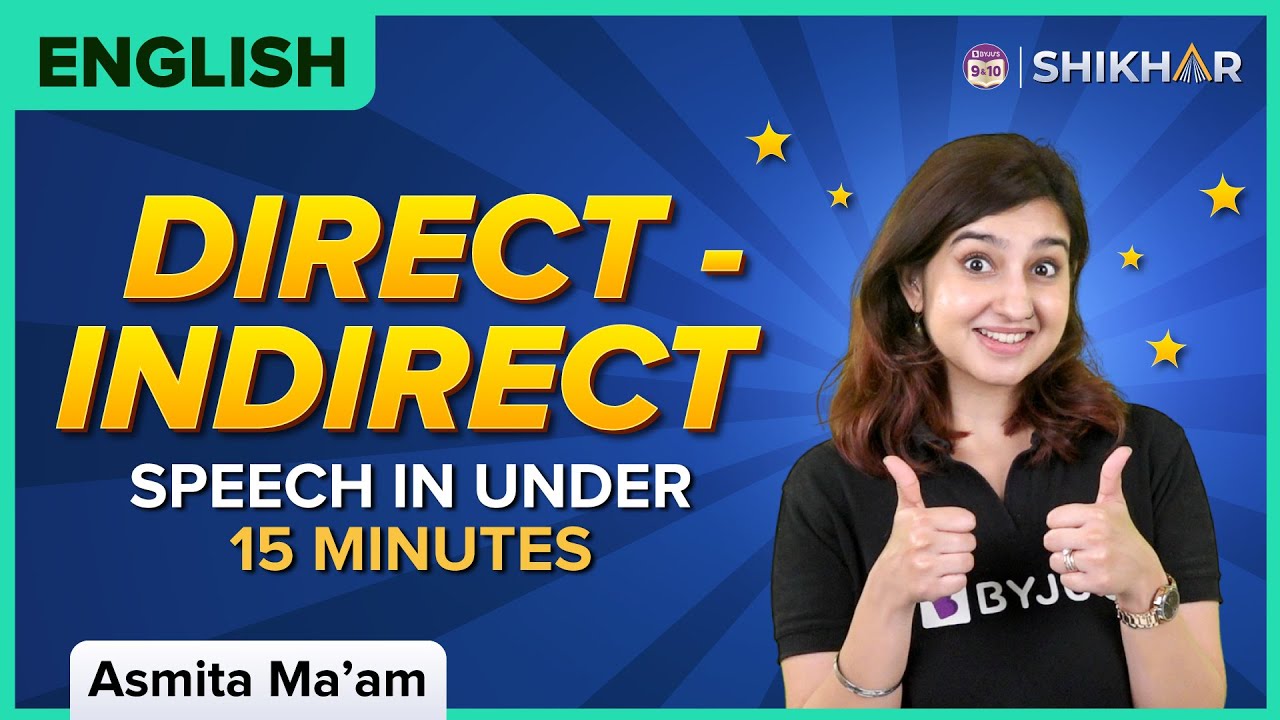Learn English Grammar: DIRECT & INDIRECT SPEECH (REPORTED SPEECH)
Summary
TLDRIn this engVid lesson, Gill explains the nuances of direct and indirect speech in English. Direct speech involves quoting someone's exact words using quotation marks, while indirect speech, or reported speech, paraphrases what was said without quotation marks and often requires tense adjustments. Examples are provided to illustrate how different tenses in direct speech translate into past tenses in indirect speech. The lesson clarifies the use of modal verbs and auxiliary verbs in both speech forms and offers a quiz on the website for further practice.
Takeaways
- 🗣️ Direct speech involves quoting someone's exact words using quotation marks.
- 📝 Indirect speech, or reported speech, is a more flexible way to convey what someone said without using direct quotes.
- 🔄 When changing from direct to indirect speech, verb tenses often shift to reflect the past context of the statement.
- 🕒 The future tense in direct speech (e.g., 'will begin') becomes conditional in the past (e.g., 'would begin') in indirect speech.
- 🏡 The present tense ('I live') becomes past ('I lived') when reported indirectly, even if the situation is current.
- 🎨 The present perfect tense ('I have finished') shifts to the past perfect ('I had finished') in indirect speech.
- 🏊 The modal verb 'can't' changes to 'couldn't' to reflect the past context in reported speech.
- ✍️ In writing, it's important to use correct punctuation, such as commas after reporting verbs like 'said'.
- 👤 Personal pronouns change from first to third person ('I' to 'he' or 'she') in indirect speech.
- 📉 There are no tense changes for past perfect and past perfect continuous tenses when switching from direct to indirect speech.
Q & A
What is the main topic of the lesson presented by Gill in the script?
-The main topic of the lesson is the difference between direct and indirect speech.
What are the two ways of reporting what someone said as mentioned in the script?
-The two ways of reporting what someone said are direct speech and indirect or reported speech.
How is direct speech defined in the script?
-Direct speech is defined as quoting exactly the words the person said, using quotation marks.
What is an example of direct speech provided in the script?
-An example of direct speech is: 'He said', quotation mark, 'I'm going to the office', full stop, quotation mark.
Why is it important to use the exact words in direct speech?
-It is important to use the exact words in direct speech to accurately represent what the person said without altering the original meaning.
What is the function of the word 'that' in indirect speech?
-In indirect speech, the word 'that' is used to introduce the reported clause and is optional; it makes the speech a bit more formal.
How does the tense change when moving from direct to indirect speech?
-When moving from direct to indirect speech, the tense usually changes to reflect that the speech is being reported in the past.
What is the difference between using 'will' and 'would' in the context of reported speech?
-In reported speech, 'will' is used in direct speech to indicate future actions, while 'would' is used in indirect speech to indicate a future action in the past.
How does the present perfect tense change in indirect speech according to the script?
-In indirect speech, the present perfect tense 'I have finished' changes to the past perfect 'I had finished'.
What are the steps Gill suggests to test your knowledge on direct and indirect speech?
-To test your knowledge on direct and indirect speech, Gill suggests going to the website www.engvid.com and trying the quiz.
What is the significance of using different verbs like 'answered' or 'mentioned' instead of 'said' in reported speech?
-Using different verbs like 'answered' or 'mentioned' instead of 'said' in reported speech can provide more context and detail about the situation in which the speech was originally made.
Outlines

Cette section est réservée aux utilisateurs payants. Améliorez votre compte pour accéder à cette section.
Améliorer maintenantMindmap

Cette section est réservée aux utilisateurs payants. Améliorez votre compte pour accéder à cette section.
Améliorer maintenantKeywords

Cette section est réservée aux utilisateurs payants. Améliorez votre compte pour accéder à cette section.
Améliorer maintenantHighlights

Cette section est réservée aux utilisateurs payants. Améliorez votre compte pour accéder à cette section.
Améliorer maintenantTranscripts

Cette section est réservée aux utilisateurs payants. Améliorez votre compte pour accéder à cette section.
Améliorer maintenantVoir Plus de Vidéos Connexes

Direct - Indirect (Reported) Speech in Under 15 Minutes | Class 9 and 10 | English | BYJU'S

Direct and Indirect Speech | Cheat Sheet Series For Class 6th & 7th

BELAJAR DIRECT AND INDIRECT SPEECH (REPORTED SPEECH)

Discover the History of English

Direct and Indirect speech in English - belajar merubah kalimat langsung menjadi tidak langsung

Direct Indirect Speech / Kalimat Langsung dan Kalimat Tidak Langsung
5.0 / 5 (0 votes)
